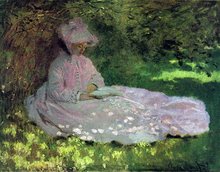I've been saying for the past few years that Jane Eyre is one of my favorite reads. I think, after reading it for this club, that my emotional state at the time of the reading has a lot to do with how much I enjoy this book.
I usually pick up this book when I am feeling romantic or lonely. When I need to escape into this ideal relationship between Jane and Mr. Rochester. At those times, this book fills that emotional need, and I get great pleasure out of it. All that said, I was feeling neither romantic nor lonely when I read it this time. I was disappointed to discover that I did not lose myself in it like I normally do. I felt more detached as I read it. I looked at it with a cooler eye, noticing more things like Jane's way of talking rather than the burning desire between her and Edward.
I normally swoon over and long for the type of relationship Jane has with Mr. Rochester. It is energetic, it is fierce. Two strong-minded personalities bending so perfectly with each other. She being so morally minded, unafraid to speak and act her beliefs ("I care for myself ... I will hold to the principles received by me when I was sane and not mad -- as I am now."). He so clever and temperamental. The tiny hints of his growing love for her ("At all events you will come back: you will not be induced under any pretext to take up a permanent residence with her?") are delicious.
But though I read the book with pleasure, I did not feel as energized as I usually do. (This brings up an interesting discussion: What do I expect a novel to do for me ... emotionally? intellectually?)
This reading did give me the opportunity to explore something I've been curious about: the differences between Jane's behavior as a child and as an adult. Bronte often refers back to Jane's brutal childhood under the power of her cousins -- John's physical abuse and the girls' disdain -- and her aunt. As an adult, Jane seems so self-assured, so unafraid. (She gives Hannah the servant a good talking to: "But I do think hardly of you. .. and I'll tell you why...") I would think that her childhood abuses would have made her timid. But she commands respect as an adult, and it's wonderful to see her example. But, I am reading the book as a product of the pop-psychology generation.
If I think about it, I can see the argument that Jane's turning point came when she finally stood up to her aunt and cousins. ("I am glad you are no relation of mine. I will never call you aunt again as long as I live.") That lashing out broke through her early timidity and began to shape the woman that she eventually became. And she became a rock.
Wednesday, February 20
Subscribe to:
Post Comments (Atom)

2 comments:
Delicious... agreed.
Rock... Absolutely!
It's totally true how one's enjoyment of a book (or a movie, etc.) can change based on moods and needs at the time. I find that especially true with Monty Python movies (yes, I know, Monty Python has nothing to do with Jane Eyre). I can watch the Holy Grail one time and think it's hilarious, and then another time and wonder whether it's the stupidest movie ever made. I always wonder what I'm going through at the time that effects how I'm viewing things. Hmmm...
Post a Comment